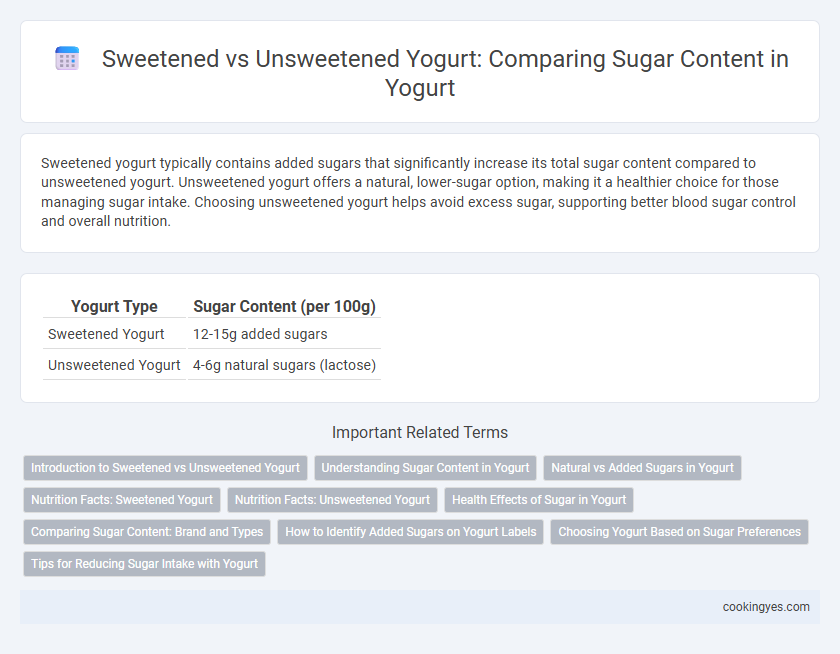Sweetened yogurt typically contains added sugars that significantly increase its total sugar content compared to unsweetened yogurt. Unsweetened yogurt offers a natural, lower-sugar option, making it a healthier choice for those managing sugar intake. Choosing unsweetened yogurt helps avoid excess sugar, supporting better blood sugar control and overall nutrition.
Table of Comparison
| Yogurt Type | Sugar Content (per 100g) |
|---|---|
| Sweetened Yogurt | 12-15g added sugars |
| Unsweetened Yogurt | 4-6g natural sugars (lactose) |
Introduction to Sweetened vs Unsweetened Yogurt
Sweetened yogurt contains added sugars that significantly increase its total sugar content compared to unsweetened yogurt, affecting calorie intake and glycemic response. Unsweetened yogurt provides natural sugars solely from lactose, offering a lower-sugar option beneficial for blood sugar control and weight management. Consumers seeking to reduce sugar consumption often prefer unsweetened yogurt to avoid extra sweeteners and maintain a healthier diet.
Understanding Sugar Content in Yogurt
Sweetened yogurt typically contains added sugars ranging from 15 to 30 grams per serving, significantly increasing its total sugar content compared to unsweetened yogurt, which has naturally occurring lactose sugars averaging around 4 to 7 grams per serving. This distinction is crucial for managing dietary sugar intake, as excessive added sugars contribute to health risks such as obesity and diabetes. Reading nutrition labels to identify added sugars can help consumers make informed choices between sweetened and unsweetened yogurt options.
Natural vs Added Sugars in Yogurt
Sweetened yogurt contains added sugars that significantly increase its total sugar content compared to unsweetened yogurt, which only has natural sugars from lactose found in milk. Natural sugars, such as lactose, provide essential nutrients without the extra calories associated with added sugars like cane sugar or high fructose corn syrup. Choosing unsweetened yogurt helps limit sugar intake and supports better blood sugar management by avoiding added sweeteners.
Nutrition Facts: Sweetened Yogurt
Sweetened yogurt typically contains between 15 to 30 grams of sugar per serving, primarily from added sugars, which can significantly increase daily sugar intake compared to unsweetened varieties that usually have less than 10 grams of naturally occurring sugar. The higher sugar content in sweetened yogurt contributes to additional calories, often raising the total to around 150 to 200 calories per 6-ounce serving versus 90 to 120 calories in unsweetened options. Consumers aiming to manage sugar intake should carefully examine Nutrition Facts labels to identify yogurt products with minimal added sugars for better nutritional control.
Nutrition Facts: Unsweetened Yogurt
Unsweetened yogurt typically contains around 5 grams of natural sugar per 100 grams, mainly from lactose, with no added sugars, making it a lower-sugar option compared to sweetened varieties, which can contain upwards of 15-20 grams of sugar per serving. Nutrition Facts for unsweetened yogurt emphasize high protein content, essential calcium, and probiotics without the extra sugar calories that contribute to increased daily sugar intake. Choosing unsweetened yogurt supports better blood sugar management and reduces the risk of excessive sugar consumption linked to obesity and metabolic disorders.
Health Effects of Sugar in Yogurt
Sweetened yogurt contains high levels of added sugars, contributing to increased risk of obesity, type 2 diabetes, and heart disease due to excessive sugar intake. Unsweetened yogurt, with minimal natural sugars like lactose, supports better blood sugar control and lowers calorie consumption, promoting metabolic health. Choosing unsweetened yogurt helps reduce daily added sugar intake, aligning with dietary guidelines that recommend limiting sugar to less than 10% of total calories.
Comparing Sugar Content: Brand and Types
Sweetened yogurt typically contains 12-20 grams of added sugars per serving, significantly higher than unsweetened yogurt, which has around 4-6 grams of naturally occurring lactose. Brands like Chobani and Yoplait offer sweetened varieties with added fruit or flavorings that increase sugar content, whereas plain Greek yogurt from brands such as Fage and Stonyfield contains minimal sugars. Comparing these options highlights the impact of added sugars in sweetened yogurts versus the lower, natural sugar levels in unsweetened yogurts.
How to Identify Added Sugars on Yogurt Labels
To identify added sugars on yogurt labels, examine the ingredient list for terms like sucrose, high-fructose corn syrup, or fruit juice concentrates which indicate sweetened yogurt varieties. Nutritional facts panels reveal total sugars per serving but distinguishing naturally occurring lactose from added sugars requires checking for added sugar declarations, often listed separately under "Sugars." Unsweetened yogurts typically contain only naturally occurring milk sugars, making ingredient scrutiny essential for managing sugar intake.
Choosing Yogurt Based on Sugar Preferences
Sweetened yogurt typically contains 15-25 grams of added sugars per serving, significantly increasing daily sugar intake compared to unsweetened yogurt, which usually has less than 5 grams of naturally occurring sugar. Choosing yogurt based on sugar content is crucial for managing weight, blood sugar levels, and overall health, with unsweetened Greek yogurt being a popular low-sugar option rich in protein and probiotics. Reading nutrition labels and selecting yogurts without added sugars supports a balanced diet and reduces the risk of chronic diseases linked to high sugar consumption.
Tips for Reducing Sugar Intake with Yogurt
Choosing unsweetened yogurt over sweetened varieties significantly lowers added sugar consumption, helping manage daily sugar intake more effectively. To reduce sugar, opt for plain Greek yogurt and enhance flavor naturally with fresh fruits, nuts, or a drizzle of honey in controlled amounts. Reading nutrition labels carefully ensures awareness of sugar content, enabling healthier yogurt choices that support balanced diets and blood sugar control.
Sweetened yogurt vs unsweetened yogurt for sugar content Infographic

 cookingyes.com
cookingyes.com